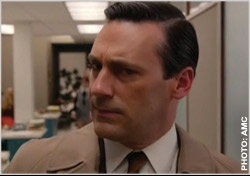
Last week, when Sally mentioned that she’d stay at her prep school “till 1975 if that would put Betty in the ground,” I thought she was being cruel. After this week, I
wanted to hand her a wire hanger with which to strangle her Mommie Dearest. I could make the whole post about changing Betty, but let me stay on track.
“Field Trip” is one of
those uber-Weinerian episodes: a few terrific scenes, an oddly stilted moment or two, and a payoff in the form of a last-minute shocker that leaves you wanting to scream at the screen, “What the
hell, Don?”
Again, it was all about appetites, choices, control, and the master theme: identity. Can you ever really change your essential self -- or your destiny?
These are the
“Mad Men” memes that try our souls, but also result in the fertile symbols that lie just below the surface of every episode, like ripening potatoes waiting to be plucked from the earth.
(After all, Farmer Cyrus told the kids that “not a lot happens above ground.")
advertisement
advertisement
And speaking of soles, please take your shoes off in Bert’s office -- all except Joan, who is allowed
to keep her high black leather boots, all the better to administer Don’s punishment in lashes at the end, like a she-wolf.
Meanwhile, Bobby tells his mom on the way to the potato farm
that his favorite movie monster is the Wolf Man, because he “changes into it.”
Whereas Betty responds with that literary monster, “Dracula.”
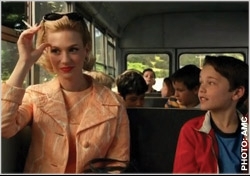 Of course, Dracula sucks blood, which kills his victims. And the scene at the farm, what with all that talk of udder pulling, was about life, and the life-sustaining, sheer
sweetness of mother’s milk. For some reason, that suckle that Mother Betty allowed herself (straight from the teat and the bucket!) set off a transformation to full green monster Betty, a petty,
jealous, soul-killer of non-nurture and irrational neediness.
Of course, Dracula sucks blood, which kills his victims. And the scene at the farm, what with all that talk of udder pulling, was about life, and the life-sustaining, sheer
sweetness of mother’s milk. For some reason, that suckle that Mother Betty allowed herself (straight from the teat and the bucket!) set off a transformation to full green monster Betty, a petty,
jealous, soul-killer of non-nurture and irrational neediness.
Of course, it’s always about her, so she showed up for a trip to the farm in high heels, sunglasses, elaborately teased and
sprayed hair, and a rather dressy designer coat/suit, a perfect look for what she’d like to be: a First Lady at a Presidential inauguration.
She has smoked and starved herself down to
perfect Hitchcockian blonde status -- and feeling shown up by Francine’s travel agent job, she is milking the only thing she knows to value: her looks, which allow her to manipulate men. Even if
the man in question is her poor little son, who adores her.
Indeed, she seems to view this school trip as some form of date, and Bobby really tries his hardest to be the proper gentleman
caller. He has a “conversation” with her, and takes the trouble to clear and save a nice seat for his mom.
That's in contrast to the glaring non-welcome that Don receives at the
agency, where he has to sit around all day, with nowhere to put his coat, reading Time magazine, like an alien visitor (The clip on the TV screen at the end of the show was “My Favorite
Martian.”) Or like he was a patient in a dentist’s office. (“Take me to your dentist!” was the line Ray Walston used in that clip.)
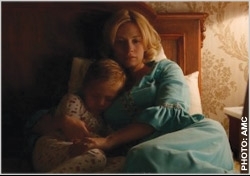 But back to Don’s son: by giving away his mom’s sandwich (which she probably would have picked at while smoking, anyway), Bobby had paid attention to another girl. Betty saw this as a
fatal betrayal that “ruined” their date. (You remember that she had that weird, crazy thing as the adult “girlfriend” of the pubescent Glenn.)
But back to Don’s son: by giving away his mom’s sandwich (which she probably would have picked at while smoking, anyway), Bobby had paid attention to another girl. Betty saw this as a
fatal betrayal that “ruined” their date. (You remember that she had that weird, crazy thing as the adult “girlfriend” of the pubescent Glenn.)
The farm trip allowed us
to see the parallel with the last-minute field trip that Don experienced last week with Sally. He told the truth to her, and apologized, and it ended with an unexpected “I love you.”
Throughout, though, Sally was the wise one -- if not quite the adult -- and Don was the child.
The parent/child turnarounds also show that most of the relationships on the show are morphing:
Father/son, wife/husband, mother/son all beg for compare-and-contrast status. (Like the carousel that Ken brings up, going round and round.)
To introduce a non-family person, let me just
say that I dislike Megan’s agent. I know he’s supposed to be smarmy, but I hate the accent, the flamboyant gay stereotype, and the fact that he reports to Don on “their girl,”
in the same patronizing, sexist way that Betty’s shrink reported to Don that he was dealing with a child.
This sets Don into action. He takes the same trip, essentially, that he did with
Sally, except this time to make things right with 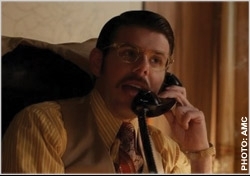 Megan. He comes clean about his lying (although she still doesn’t know about Sylvia). But his handling of her fears of rejection was
obviously insensitive. (Most actors in Hollywood become suicidal messes at times.)
Megan. He comes clean about his lying (although she still doesn’t know about Sylvia). But his handling of her fears of rejection was
obviously insensitive. (Most actors in Hollywood become suicidal messes at times.)
This time, Megan comes across as the clear-headed adult who didn’t need Don’s patronizing
paternalism. “Thanks for the advice, Daddy,” she says in a slapdown. She responds to his sudden honesty by telling him to go home. “This is the end,” she says, in a scene
that resonates with the complicated truths of real relationships and comes off as pitch-perfect.
Listening to Megan’s orders, Don heads “home.” But what is his home? Deep
within, he is a motherless, homeless child, a hobo “riding the rails,” to use Stan’s joke. His only pride comes from the agency that he built. So he goes back there.
After
the meeting with WRG (which of course was the job he should have taken if this were not a soap opera), he chooses not to knock on the door of temptation (the hooker) but instead goes to the door of
reinvention: Roger.
“I thought you were a BLT,” Roger tells Don, like the Roger of old. And strangely, he is attired in a smoking jacket to greet his hippie girlfriend.
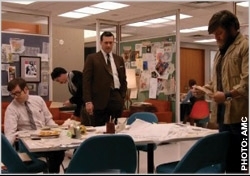 As we all know, reinvention is rough. Throughout the episode, Don keeps looking at his Omega watch. This time, he is clearly no longer the alpha/omega of the office. Instead, he’s in The
Twilight Zone (Rod Serling was mentioned in the conversation with the agent), where Don's former protégé Peggy tells him he was not missed, and his replacement, Lou, in his tacky sweater
and even worse jokes, is the anti-Don.
As we all know, reinvention is rough. Throughout the episode, Don keeps looking at his Omega watch. This time, he is clearly no longer the alpha/omega of the office. Instead, he’s in The
Twilight Zone (Rod Serling was mentioned in the conversation with the agent), where Don's former protégé Peggy tells him he was not missed, and his replacement, Lou, in his tacky sweater
and even worse jokes, is the anti-Don.
Still, he has no idea how much his former colleagues at Sterling, Cooper will turn on him. But he seems to be willing to take all the humiliation, as
long as he gets a chance to rebuild.
The last few minutes, at the board meeting, were bravura. Joan reads the Draconian demands required of him for coming back: no drinking, follow the script
in presentations, no private meetings with clients, report to Lou. Recipe for disaster, much?
But the final one is the real killer: he is to sit in Lane’s old office. Lane is the dead
man who, in a Christ-like image, was found hanging on his door. Don cut him down.
These are crippling punishments, obviously meant to send him away. To everyone’s shock -- especially the
viewer’s -- Don says, “Okay.”
This is where his childhood grit comes in. He thinks he can outwit (he is a Whitman, after all) the hideous, soulless, Lou -- which he probably
can. He can make some strides in creative, although Jim, now Joan’s best friend, doesn’t value that, and wants a computer.
He is the Cheval Blanc.
So he will either be
reborn from the ashes of the dead man's office -- his new digs -- or go up in flames (like the previous references to Dante’s Inferno).
Only Don sees clearly how true the lyrics in the
Jimi Hendrix song, “If 6 was 9,” that was brilliantly used to close the episode, are:
“If the mountains fell in the sea
Let it be, it ain't me
Alright, 'cos I
got my own world to look through
And I ain't gonna copy you.”
He won’t be the only working parent in the family. My prediction: Betty gets a job.